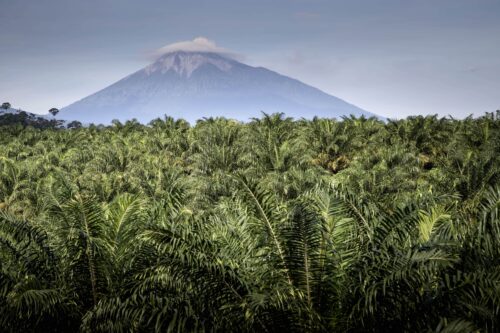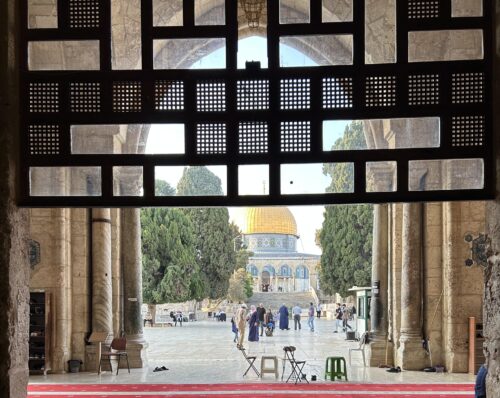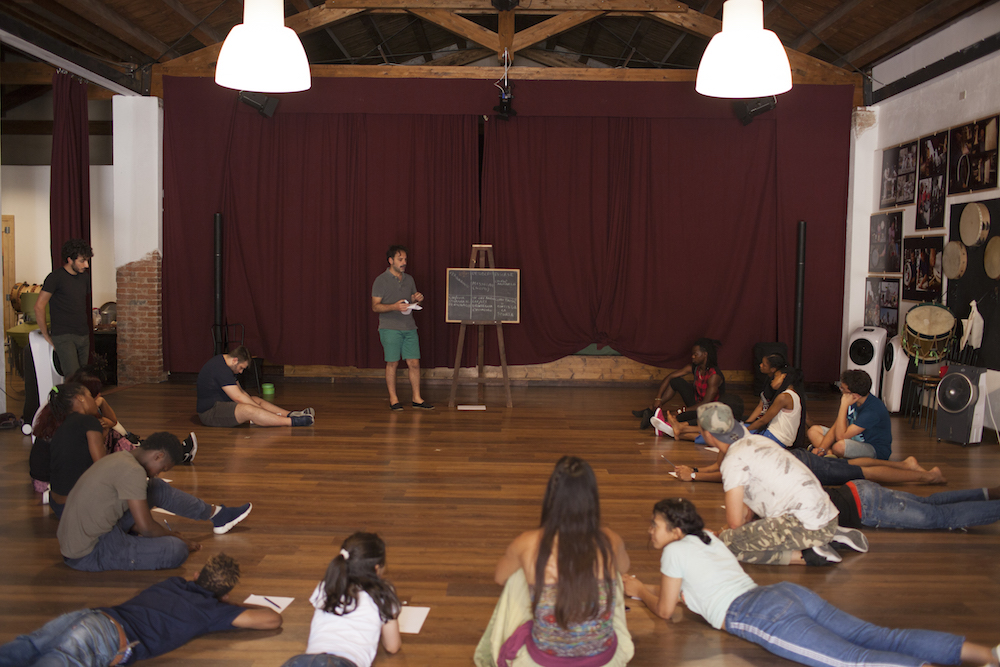How Migrant Filmmakers Practice Archival Activism

In the first scene of the short coming-of-age film Jabal-la montagna, viewers see a young woman venturing out alone onto a desolate street in Palermo, Italy. The film traces the story of Giusy, who leaves her group home after feeling misunderstood by those around her. When she witnesses the mugging of an older man, Giusy feels compelled to intervene. After she successfully recovers the wallet, she runs after the man as he’s getting on a bus and returns it to him. The rest of the film focuses on Giusy as she befriends this man—who turns out to be a poet—and follows him to the outskirts of the city.
While the dark but ultimately hopeful film focuses on a young Italian woman’s struggle for social acceptance, the migrant youth behind Jabal-la montagna’s creation see their own journeys reflected in the character’s story. The film was produced by the collaborative, participatory film laboratory FunKino—Cinema for Inclusion based in Palermo, Sicily. A project of the nonprofit organization Zabbara, the laboratory provides mentoring to migrant youth in film and other forms of digital storytelling. The film’s creators hope that Italian audiences come away with more awareness and empathy for the struggles that other marginalized groups in Southern Europe face, including migrants.
More than 2 million people, mostly from Africa or the Middle East, have migrated by sea to Southern Europe since 2014. Those seeking asylum are fleeing conditions of severe poverty, food insecurity, military conscription, civil unrest, war, and environmental collapse.
Italy and the rest of the EU have earned the name “Fortress Europe” due to their increasingly harsh stance toward these migrants, including fortified surveillance and militarization of their borders, the criminalization of solidarity efforts, and turning a blind eye to the unrelenting tragedy of migrant deaths at sea. Migrants who do manage to cross into Europe are often subjected to overcrowding in reception facilities, bureaucratic delays in asylum processing, and racialized exploitation as workers.
Palermo, where FunKino was founded in 2017, has become somewhat of a refuge from these harmful policies; the mayor has declared the city as one of “rights, welcoming, tolerance, and culture.” For the past several years, I have been following FunKino’s work to challenge anti-migrant bias and corresponding with its co-founders while carrying out research on migrant solidarity in the central Mediterranean.
According to co-founder Alessio Genovese, an Italian filmmaker, the lab supports two primary objectives: First, the organization facilitates the entry of people with a migrant background into the realm of Italian cinema, an industry that has systematically excluded them. Second, it foregrounds migrants’ voices in educating Italian and European publics about contemporary migration. For lab participants, the latter objective is particularly important at a moment when far-right campaigns of dis- and misinformation continue to scapegoat migrants and refugees in Europe for an array of social ills and embolden White supremacists to commit anti-migrant violence.
As an anthropologist who thinks a lot about whose stories get preserved in archives, I’ve come to see this part of FunKino’s work as an important example of what scholars and practitioners call “archival activism,” or radical history-making activities performed by ordinary people.
So, what exactly counts as archival activism, and why does it matter?
Archival activism starts from the recognition that archives, as repositories of the past, are not neutral. Postcolonial and feminist scholars—from Stuart Hall and Gayatri Chakravorty Spivak to Michel-Rolph Trouillot—have long drawn attention to the political potential (and dangers) of archives in shaping relations of power and conceptualizations of heritage and belonging in a society. Philosopher Jacques Derrida suggested that the strength of any democratic society is measured by access to and influence over the archive.
To interpret the archive as a space of activism is to recognize how the Archive, with a capital “a,” has systematically excluded those with less power and privilege. It also requires committing to a decolonial approach to knowledge production, which means rethinking whose stories get included, referenced, and highlighted in any record of the past.
Archival activism starts from the recognition that archives, as repositories of the past, are not neutral.
According to Andrew Flinn, a professor of archival studies and oral history, archival activism occurs outside of institutions of power, such as government or the private sector, and requires broad participation by diverse communities to address historical gaps. Instead of relying only on official published records or other types of written accounts, a decolonial and activist approach might include oral histories, works of art, photographs, everyday objects, or other sources within archives.
Seen from this angle, archival activism is a crucial part of a broader effort led by decolonial and feminist scholars to rewrite and reexamine the violent harms of roughly 500 years of European imperialism and global capitalism. These efforts, for example, might attempt to capture accounts of current patterns of mass migration and place them within a longer history of colonialism, slavery, and forced displacement and dispossession.
Likewise, in response to the COVID-19 pandemic, a number of initiatives have implicitly underscored the ethical obligation of archival activists to preserve stories that are often made invisible and excluded. The laudable Pandemic Journaling Project, for instance, directed by anthropologists Sarah Willen and Katherine Mason, pushes against historically imperialist renderings of “the past.”
As Willen and Mason assert on the project’s website: “Usually, history is written only by the powerful. When the history of COVID-19 is written, let’s make sure that doesn’t happen.”
Filmmaking, for FunKino participants, serves a similar purpose: It’s a way to ensure that their voices and stories get documented and preserved in the historical record.
At each iteration of FunKino’s lab, often hosted in one of Palermo’s myriad old palazzi (large historic buildings or “palaces”), cohorts of 10 to 15 youth gather for several weeks to learn about the different practical and technical aspects of filmmaking. Participants are typically in their late teens or 20s, have originated from throughout the African continent or the Middle East, have often only been living in Sicily for a short time, and self-identify across diverse gender, racial, and ethnic backgrounds.
During these sessions, in addition to learning about directing, cinematography, sound effects, and the use of equipment, youth participants collaborate in weaving together different aspects of their individual life experiences for the purposes of storyboarding and creating short films.
Media and migration studies scholar Karina Horsti has described such collaborative storytelling projects as forms of archival activism that have the potential to transcend social and spatial boundaries as well as temporal ones, generating solidarity across generations. For instance, by referring to the present day as “the future past,” she asks whether the European public may begin to wonder about how their treatment of migrants will be understood by future generations. Will they be viewed as having stayed complicit with Fortress Europe and border imperialism, or will they have rejected the anti-Black, Islamophobic, and xenophobic immigration policies that have led to the suffering and deaths of migrants in the Mediterranean?
In the short-term, FunKino aspires to transform public dialogues about migration and to improve the material and political possibilities for those arriving to Europe. But lab participants regularly allude to even bigger aspirations. Through their storytelling, they say, “[We] are actually saving lives and encouraging somebody [to take action].” As both a radical history-making and future-making project, archival activism such as that enacted by FunKino seeks to strengthen alliances among present-day citizens and noncitizens, and among present and future generations.
No such endeavor is absent of tensions, such as interpersonal conflict, individual and collective pain, and, possibly, trauma—especially when people have been historically misrepresented and excluded based on such misrepresentations. FunKino’s co-founders must facilitate and translate discussions among participants who do not speak a common language, despite sharing interests that form the basis of their solidarity.
Participants not only vary by age, nationality, and gender, but also by the reasons and aspirations that underpinned their decisions to migrate. Yet, at the end of every lab, they still manage to produce a creative work that everyone has contributed to in order to reflect their collective experience. As asserted by one of FunKino’s past participants, “[Our film will] make people understand that we can think, that we have ideas.”
In the past year, due to the pandemic, FunKino’s umbrella organization Zabbara has had to pivot from offering in-person iterations of the lab to finding alternatives for collaborative storytelling. This has included producing the animated children’s web series Yaron Daggi (Child of the Savanna), led by Nigerian director and actor Ide Maman. The series (available for streaming in Italian) follows the encounters between Nurah, a human child of the savanna, and the savanna’s nonhuman inhabitants, including a wise lion, an awkward hippopotamus, a nervous rhinoceros, a spiteful monkey, and a whiny snake, among others. The episodes explore how the fear of difference can be overcome through curiosity and a desire to learn about the other.
The animated series closes with this aspirational statement: “To unite is to live in peace” (Unirci è vivere in pace).
This might be read as the ultimate goal of archival activism—to force a reckoning with the injustices of the past and ensure that there is a more inclusive record for the future. These efforts to democratize spaces of heritage and belonging are necessary for challenging systems of oppression and supporting justice for past, present, and future generations.

































